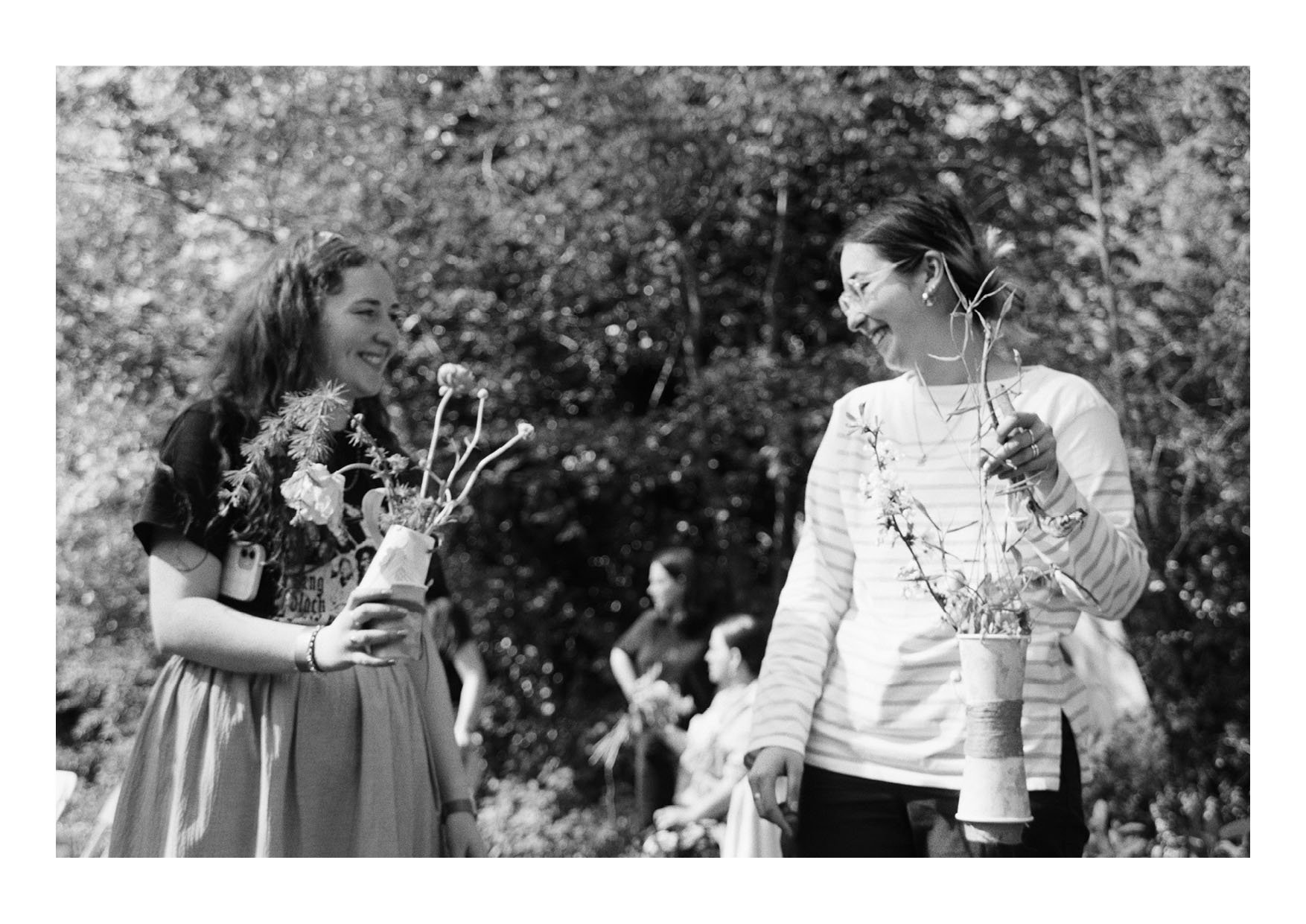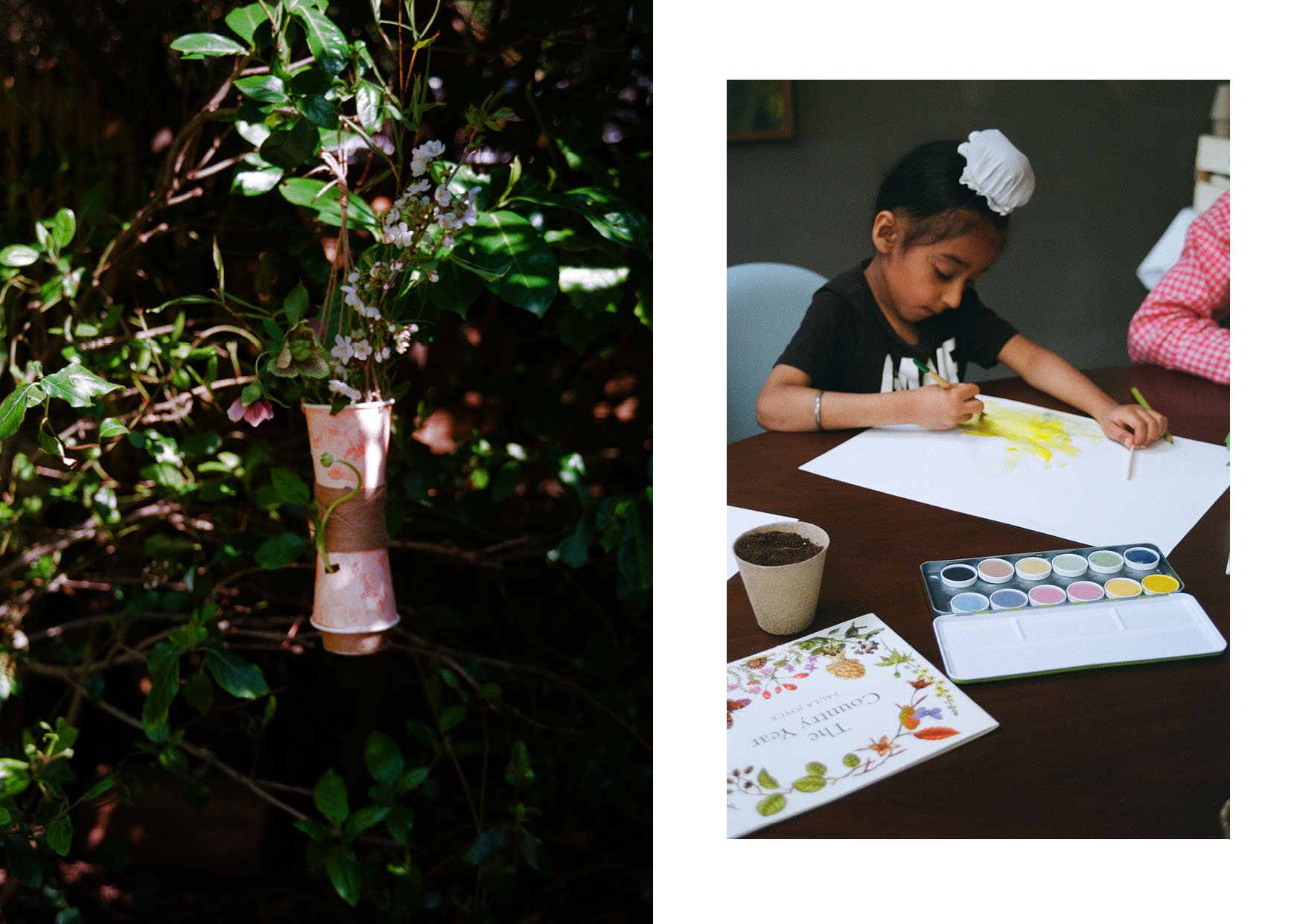Growing Compassion with The Gardening Drawing Club
“Gardening and drawing shall not be a privilege.” – The Gardening Drawing Club
Words by Reeme Idris
Everyone is welcome to join The Gardening Drawing Club, it is free for all; the only tools participants are required to bring are their hands and hearts. Adults and children alike learn the value of veganic gardening methods and deep ecology through different horticultural activities, including (Almost) Ikebana, a playful take on the Japanese art of arranging flowers. “The Gardening Drawing Club (TGDC) is a way to foster joy, togetherness, knowledge and compassion for all living,” explains founder and workshop facilitator Johanna Tagada Hoffbeck.
Created in response to the barriers faced during lockdown periods, the nomadic project has held 22 workshops in a wide variety of locations across London and the South of England since April 2022. While they would like to expand their current remit, TGDC remains conscious of those whose social and financial circumstances might restrict their engagement with culture, quoting (former publisher at The National Trust) Margaret Willes, “London has a particular pressure on land, and many who would love to garden find themselves without the opportunity to do so.” Undoubtedly, the pandemic exacerbated this, as well as other, inequalities.
French sociologist Pierre Bourdieu (1930-2002) was the son of a postman, and worked as a teacher before becoming the influential intellectual who coined the term “cultural capital” – referencing the classic Marxist theory of economic capital – which can be summarised as the “domestic transmission” of education, knowledge, language and habits that are valued by society, and most helpful in advancing an individual’s journey to success. Bourdieu’s theoretical approaches to class, status and power came to the fore once more in England, when The Office for Standards in Education (Ofsted) used the term (in their Education Inspection Framework 2019) as part of the government’s commitment to improving social mobility. Since then, educators of all kinds, myself included, reignited the debate on what this meant for children growing up in modern (British) society.
Many felt that it would be a mistake to presume “cultural capital” must conform to one specific culture, or adopt a deficit mindset and become preoccupied with gaining capital to win at Bourdieu’s “game of life”. Instead, we should consider this concept in line with developing the confidence and disposition needed to be effective learners, starting with ourselves, by understanding what an individual (child) already knows and extending relevant opportunities from there – such as experiencing the awe and wonder of the natural world. In my opinion, this expansive and inclusive approach couldn’t be better exemplified than by the work, and ethos, of The Gardening Drawing Club.
“The Gardening Drawing Club is a (re)connection to the soil and people. The drawing aspect brings me, and us, all back to the simple act [of drawing] and childhood,” says Jatinder Singh Durhailay, who provides production and technical support for the project. The handy TGDC lexicon introduces, for example, the “biophilia hypothesis” – that humans have an innate tendency to interact and connect with nature and other living beings – and lists the “attention restoration theory,” which suggests that “interaction with a restorative environment, such as spending time in a natural environment, for example, a forest or a garden, relieves mental fatigue and stress and can improve one state of mind and focus.” Both terms help legitimize and prioritize what we know to be true, neither of which I was aware of, however, until browsing their website.
The Gardening Drawing Club’s programme assistant Minami Kanesawa, based in Japan, also appreciates the club from afar, “I enjoy seeing participants’ drawings, (Almost) Ikebana pieces and smiles in the event photographs.” So far, TGDC has been incorporated in two of Johanna’s own exhibitions in Japan as part of the Poetic Pastel initiative, “We hope to be able to continue this project for many years, keep learning and sharing, encourage compassion, and work on a publication in the coming years too,” she adds, while preparing to begin a one-year residency at Camden Art Centre. As one of the Leading Artists in their Learning Programme, Johanna will work with children from a local primary school in art and gardening, with access to Camden Art Centre’s ceramic studio and garden for her practice, “I imagine this will inform some of my next artwork; I feel very enthusiastic.” The beauty of The Gardening Drawing Club lives in both its purpose and expression, while the joy shared by the team seems to be contagious – may it spread far and wide.
The Gardening Drawing Club is a non-profit initiative that welcomes your support to continue thriving. See how you can help here.
Credits:
Drawings and paintings by TGDC workshop participants, including Aagia Kaur and Parminder Kaur.
Words by Reeme Idris, photography by Johanna Tagada Hoffbeck.
Reeme is a freelance writer and holds early years teacher status (EYTS) as co-owner of Oxford Day Nursery in Ilford, Essex.












